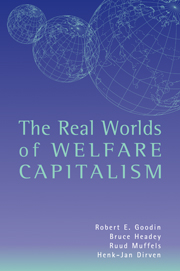Book contents
- Frontmatter
- Contents
- Preface
- Acknowledgments
- 1 Introduction
- Part I Setting the scene
- Part II One standard of success: external moral criteria
- 7 Promoting effciency
- 8 Reducing poverty
- 9 Promoting equality
- 10 Promoting integration
- 11 Promoting stability
- 12 Promoting autonomy
- Part III Another standard of success: internal institutional criteria
- Appendix tables
- References
- Index
7 - Promoting effciency
Published online by Cambridge University Press: 22 September 2009
- Frontmatter
- Contents
- Preface
- Acknowledgments
- 1 Introduction
- Part I Setting the scene
- Part II One standard of success: external moral criteria
- 7 Promoting effciency
- 8 Reducing poverty
- 9 Promoting equality
- 10 Promoting integration
- 11 Promoting stability
- 12 Promoting autonomy
- Part III Another standard of success: internal institutional criteria
- Appendix tables
- References
- Index
Summary
Efficiency means many different things, as chapter 2 has shown, and not all of them are well captured in the panel data. Nevertheless, these data do directly and effectively address the two key components in the classic ‘equity versus efficiency’ critique of the welfare state.
Arthur Okun (1975) offers the image of the welfare state as a ‘leaky bucket’. Some of the benefits we try to deliver to the poor simply seep away before reaching them. One source of leakage is ‘work disincentives’. Suppose that, for every dollar transferred by welfare programmes to the poor, the poor themselves work fewer hours, thereby reducing their earned income by half a dollar; then in Okun's terms half the dollar we were trying to transfer to them has seeped away. A second source of leakage, in Okun's classic account, is ‘target inefficiency’: if half the money we transfer to people through welfare programmes goes to people other than those we were trying to help through the programmes in question, then again half the money has seeped away. Both of those more specific efficiency issues can and will be addressed through panel data, presented in sections 7.4 to 7.6 below.
When economists, and politicians influenced by them, talk of the ‘economic inefficiency’ of the welfare state, however, they often refer to nothing so specific as that.
- Type
- Chapter
- Information
- The Real Worlds of Welfare Capitalism , pp. 125 - 151Publisher: Cambridge University PressPrint publication year: 1999



